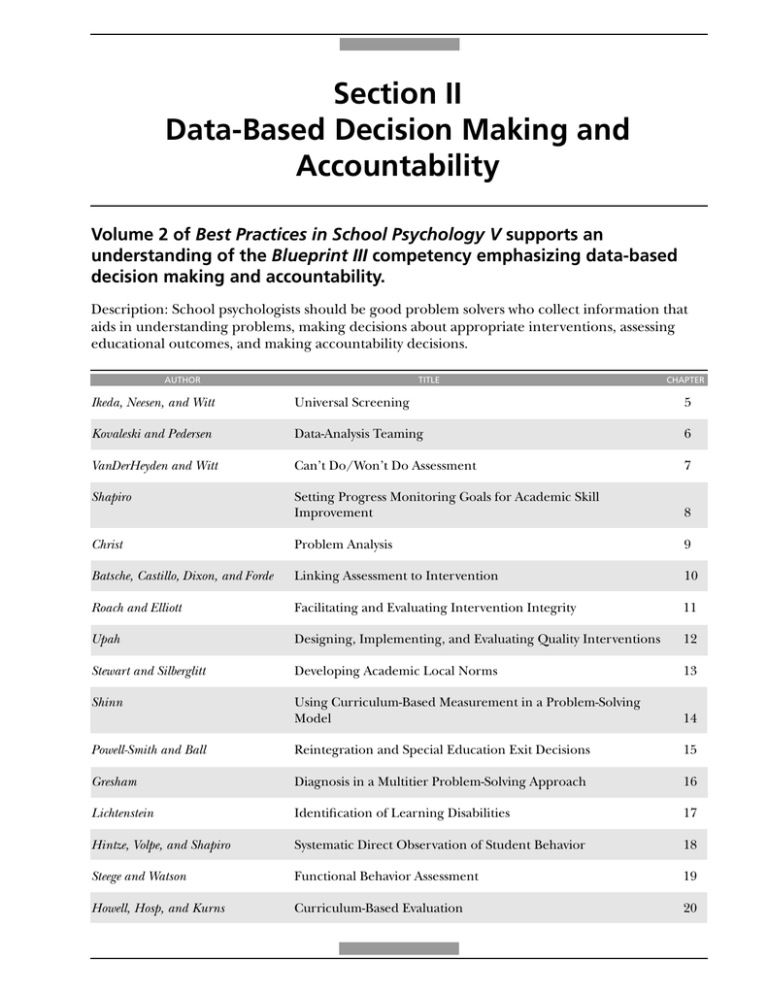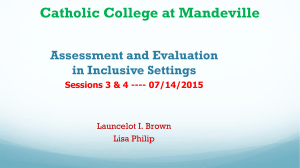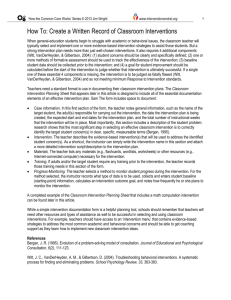Section II Data-Based Decision Making and Accountability Best Practices in School Psychology V
advertisement

Section II Data-Based Decision Making and Accountability Volume 2 of Best Practices in School Psychology V supports an understanding of the Blueprint III competency emphasizing data-based decision making and accountability. Description: School psychologists should be good problem solvers who collect information that aids in understanding problems, making decisions about appropriate interventions, assessing educational outcomes, and making accountability decisions. AUTHOR TITLE CHAPTER Ikeda, Neesen, and Witt Universal Screening 5 Kovaleski and Pedersen Data-Analysis Teaming 6 VanDerHeyden and Witt Can’t Do/Won’t Do Assessment 7 Shapiro Setting Progress Monitoring Goals for Academic Skill Improvement 8 Christ Problem Analysis 9 Batsche, Castillo, Dixon, and Forde Linking Assessment to Intervention 10 Roach and Elliott Facilitating and Evaluating Intervention Integrity 11 Upah Designing, Implementing, and Evaluating Quality Interventions 12 Stewart and Silberglitt Developing Academic Local Norms 13 Shinn Using Curriculum-Based Measurement in a Problem-Solving Model 14 Powell-Smith and Ball Reintegration and Special Education Exit Decisions 15 Gresham Diagnosis in a Multitier Problem-Solving Approach 16 Lichtenstein Identification of Learning Disabilities 17 Hintze, Volpe, and Shapiro Systematic Direct Observation of Student Behavior 18 Steege and Watson Functional Behavior Assessment 19 Howell, Hosp, and Kurns Curriculum-Based Evaluation 20 AUTHOR TITLE Hosp Aligning Academic Assessment With Instruction Hosp and MacConnell Curriculum-Based Evaluation in Early Reading CHAPTER 21 22 Howell Curriculum-Based Evaluation and Advanced Reading 23 Kelley Curriculum-Based Evaluation and Math 24 Robinson and Howell Curriculum-Based Evaluation and Written Expression 25 Clarke, Baker, and Chard Mathematics Assessment and Intervention With Elementary Students 26 Ketterlin-Geller, Baker, and Chard Mathematics Instruction and Assessment in Secondary Settings 27 Malecki Written Language Assessment and Intervention 28 Jones, Wickstrom, and Daly III Brief Assessment of Reading Concerns 29 Gravois and Gickling Instructional Assessment 30 Slentz and Hyatt Applying Curriculum-Based Assessment in Early Childhood 31 Greenwood, Carta, Baggett, Buzhardt, Walker, and Terry Integrating Progress Monitoring and Response-to-Intervention Concepts Into Early Childhood Systems 32 Kelly-Vance and Ryalls Play Assessment and Intervention 33 McConnell and Missall Monitoring Progress for Preschool Children 34 Braden and Tayrose Educational Accountability: High-Stakes Testing and Educational Reform 35 Braden and Joyce Making Assessment Accommodations 36 Harrison and Raineri Assessment of Adaptive Behavior 37 Tobin, Schneider, Reck, and Landau Assessment of Children With Attention Deficit Hyperactivity Disorder: Linking Assessment to Response to Intervention 38 Flanagan, Ortiz, Alfonso, and Dynda Cognitive Assessment 39 Ortiz Nondiscriminatory Assessment 40 Naglieri Linking Cognitive Assessment of Students With Learning Disabilities to Interventions 41 Multimethod Assessment of Emotional and Behavioral Disorders 42 McConaughy and Ritter




